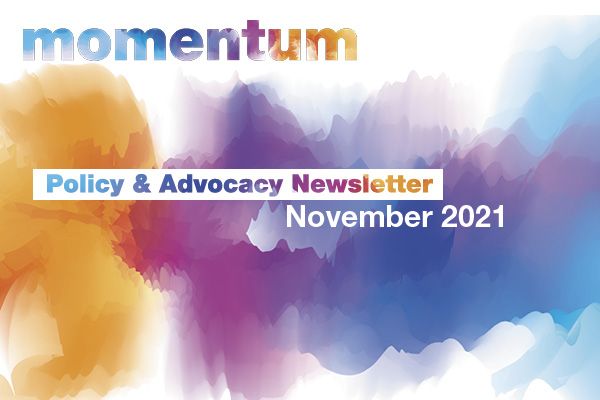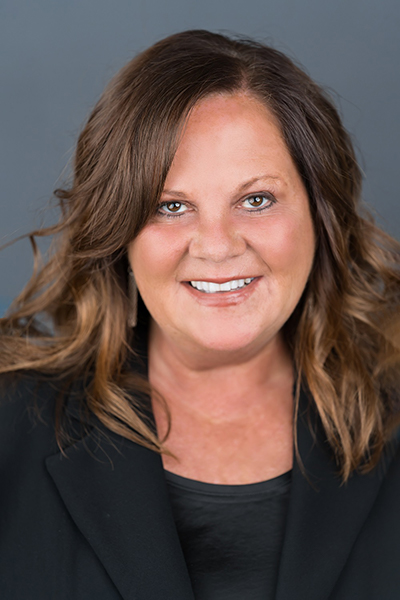
Policy and Advocacy News – November 2021

A Note from the CEO…
This month, Americans throughout the U.S. joined together to observe Veterans Day – a day to honor all U.S. military veterans and thank them for their selfless service to their country.
One tangible and important way to thank and honor our brave veterans, particularly those who were wounded in battle, is to work to create accessible communities that allow them to live, work and participate without physical barriers that limit opportunities.
U.S. Senator Tammy Duckworth, a decorated U.S. Army veteran who lost both her legs in the Iraq war, led an effort to include funds in the recently passed infrastructure bill to make all U.S. transit centers fully accessible. This is a great accomplishment, but so much more needs to be done to eliminate the physical barriers that limit people with disabilities, including wounded U.S. veterans, from fully participating in society.
I applaud Senator Duckworth’s efforts in securing these infrastructure funds for people with disabilities. Momentum will continue to advocate for and work toward fully inclusive communities.
Lori Anderson
President and CEO

Momentum’s VoterVoice Advocacy Center
Advocacy Contacts
Governor Gavin Newsom
Phone: (916) 445-2841
Fax: (916) 558-3160
Internet Contact Form Access – Here
Twitters: @GavinNewsom @CAgovernor
Find Your Representatives
Use the links below to identify your representatives and let your opinion be heard.
U.S. House of Representatives
U.S. Senate
California State Legislature
National News
Advocacy Needed as Build Back Better Act Faces Significant Legislative Roadblocks
The U.S. House of Representatives voted this month on H.R.5376, the Build Back Better Act (BBB), that originally included $400 billion to expand access to home and community-based services (HCBS). The HCBS portion of the BBB has been trimmed from $400 billion to $150 billion to fit within the current $1.9 trillion framework for the legislation.
The House waited for a score, or cost assessment, from the Congressional Budget Office (CBO) before proceeding with a final vote to send the BBB to the Senate. At this point, it is unclear whether there are 50 votes in the Senate needed for approval of the House Bill.
The HCBS provision would strengthen and expand access to HCBS programs and the HCBS workforce, as well as create additional incentives for innovations such as improved coordination between stakeholders and innovations around safety and work quality. The health care spending provisions (including the $150 billion for HCBS) in the current House Bill appear stable and are not likely to be changed when the Bill moves to the Senate. However, the anticipated long, drawn-out Senate process creates opportunities for all provisions in the bills to be debated and reconsidered.
In addition to expanding access to Medicaid HCBS, the BBB Act makes the Money Follows the Person (MFP) permanent beginning in 2023, a change from 2022 written in the original legislation. The MFP program was created to eliminate barriers in state law, state Medicaid plans, and state budgets that restrict the use of Medicaid funds to enable Medicaid-eligible individuals to receive support for appropriate and necessary long-term services and supports in the settings of their choice as well as implement procedures to provide quality assurance and improve HCBS. To date, California has received more than $197 million in MFP funding from the Centers for Medicare and Medicaid Services (CMS).
The BBB Act also outlines Medicaid eligibility redetermination processes that states must use to maintain current levels of funding by requiring that prior to disenrolling individuals pursuant to an eligibility redetermination, the state must make two attempts to reach out to the individual, and on the second attempt provide a 30-day notice before disenrollment. In addition, the state can only initiate eligibility redeterminations for 1/12 of individuals enrolled in a state plan during any month from April 1, 2022, through September 30, 2022.
States would need to submit a monthly report to the Secretary outlining key metrics about eligibility renewals, terminations, and additional redetermination data. Since Medicaid redeterminations were suspended during the COVID-19 Public Health Emergency, advocates are concerned that people with disabilities will be disenrolled from critical Medicaid services without adequate warnings or sufficient time to address state concerns.
Infrastructure Bill Includes $1.75 Billion to Improve Accessibility at U.S. Transit Centers
On November 5, the U.S. House of Representatives passed H.R. 3684, the Infrastructure Investment and Jobs Act, by a bipartisan vote of 228 to 206. The $1.2 trillion legislative package is intended to repair and rebuild the country’s public work infrastructure system.
Tucked into the Bill was a little-noticed $1.75 billion to address accessibility issues at U.S. transit stations. Although the Americans with Disabilities Act (ADA) was passed more than 31 years ago, almost 20% of U.S. transit stations are not fully accessible, according to the most recent Federal Transit Administration data.
Leading the effort for the accessibility funding was Sen. Tammy Duckworth (D-Ill.), a retired Army National Guard lieutenant colonel and helicopter pilot, who lost both her legs in combat in the Iraq War. The $1.75 billion is a small fraction of the $1.2 trillion in the infrastructure measure.
Even though the $1.75 billion accessibility program is a small fraction of the overall $1.2 trillion price tag, Duckworth said the program’s supporters had “to push pretty hard” to secure its place in the final Bill. The Bill also mandates that a person with disabilities must be appointed to AMTRAK’s board and mandates spending on accessibility, which Duckworth said helped show that accessibility was a national issue and not only an urban concern.
More than 25 million U.S. citizens report having a disability that limits their transportation options, and the Labor Department attributes lower rates of employment among people with disabilities, in part, to those obstacles. Sen. Duckworth said she is not able to ride the New York subway, which has relatively few accessible stations, and said even the Metro in Washington, D.C. has proved a challenge because elevators are frequently out of service.
HHS Extends COVID-19 Public Health Emergency
The U.S. Department of Health and Human Services recently announced it was extending the declaration of a public health emergency (PHE) related to the COVID-19 pandemic. HHS is renewing its PHE declaration for another 90 days through January 16, 2022.
The extension of the PHE also extends the availability of the 6% Federal Medical Assistance Percentage (FMAP) increase, authorized by the Families First Coronavirus Response Act (FFCRA) to California and all states. The FFCRA states that the 6% FMAP increase is available through the last day in the calendar quarter in which the PHE is declared. Since the PHE now expires in January 2022, the 6% FMAP increase is available through the end of March 2022. This coincides with the termination of the FMAP bump authorized by the American Rescue Plan (ARP), which is explicitly set out in statute as available from April 1, 2021 through March 31, 2022.
California News
North Los Angeles County Regional Center Announces Legislative Town Hall
The North Los Angeles County Regional Center (NLACRC) has announced a virtual Town Hall Meeting on November 30 from 6:00 pm to 7:30 pm, to be held via zoom. Self-advocates, families, disability support providers, direct support professionals, and all interested community members are encouraged to attend this event to hear from their elected officials about disability policy and actions in Sacramento and how their activities impact the lives of people with disabilities and their families. Attendees are encouraged to contact Megan Lysolm at (818) 756-6234 or email her at mlysholm@nlacrc.org to submit questions for the legislators or to ask questions about the town hall.
Click here to register for the town hall and to get the link for the online Zoom event.
SAVE THE DATE – California Disabilities Public Policy Conference to be Held March 14-16
The 15th annual California Public Policy Disabilities Conference will be held March 14 and 15, 2022, with a disability lobby day at the California State Capitol. The return to an in-person conference is, of course, tentative and will be based on the ongoing COVID-19 pandemic. The conference is held to inspire, educate, and empower attendees to become advocates for Californians with intellectual and developmental disabilities (IDD). The conference, co-sponsored by The Arc and United Cerebral Palsy California Collaboration, features nationally known speakers who have been trailblazers for promoting policies that improve the disability system — enabling people with IDD to live inclusively in their communities.
Attendees include governmental officials, and leaders within the IDD community, including self-advocates, family members, support professionals, and academicians. Attendees will walk away with a deeper understanding of the current public policy reality for the disability system, and a renewed sense of empowerment to design a future together where every person has an opportunity to live their best life.
Registration information will be provided in future public policy newsletters.
california, Lori Anderson, momentum, policy and advocacy, UCPLA